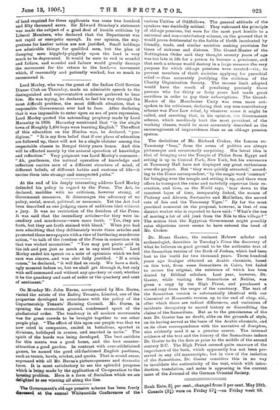The q-eVernment's old-age pension scheme has been freely *tweed at
the mutual Whiteuntide Conferences of the various Unities of Oddfellows. The general attitude of the speakers was decidedly critical. They welcomed the principle of old-age pensions, but were for the most part hostile to a universal and non-contributory scheme, on the ground that it would prove detrimental to the habits of thrift inculcated by friendly, trade, and similar societies making prevision for times of sickness and distress. The Grand-Master of the Nottingham Order said they thought seventy years of age was too late in life for a person to become a pensioner, and that such a scheme would destroy in a large measure the very purpose for which old-age pensions were created—viz., to prevent members of thrift societies applying for parochial relief — thus accurately justifying the criticism of the Charity Organisation Society. The income limit adopted would have the result of penalising precisely those• persons who for thirty or forty years had made great sacrifices in order to pay their subscriptions. The Grand- Master of the Manchester Unity was even more out- spoken in his criticisms, declaring that any non-contributory scheme was Poor Law relief, by whatever name it might be called, and asserting that, in his opinion, the Government scheme, which needlessly hurt the most provident of the working classes, would be more accurately described as the encouragement of improvidence than as an old-age pension system.






































 Previous page
Previous page